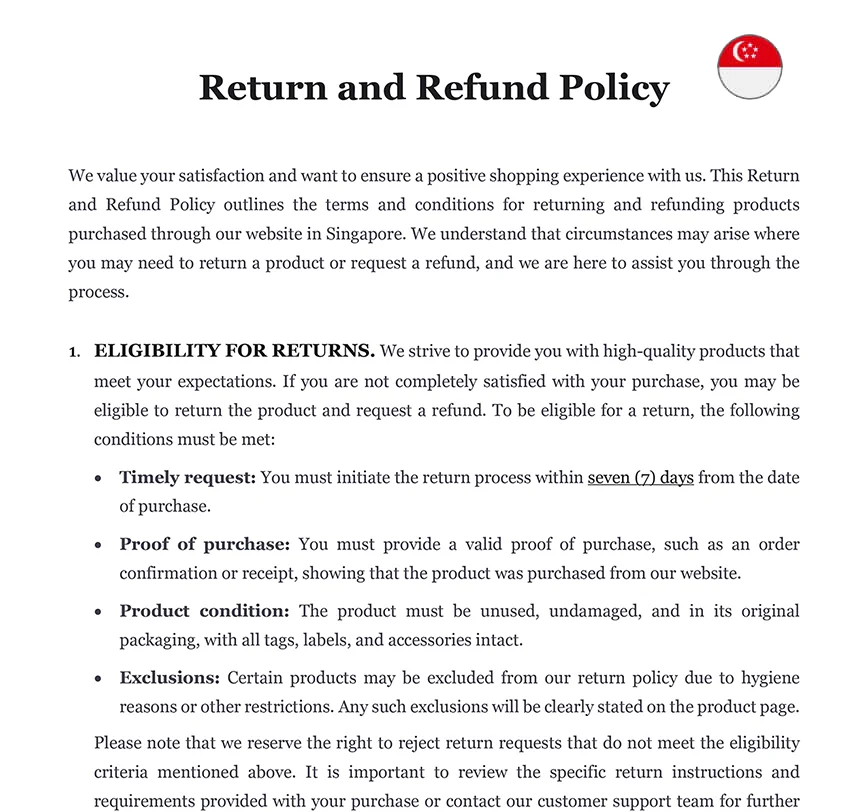Ready to use legal template
Drafted by experienced lawyers
Compliant with Singapore law
Ready to use legal template
Drafted by lawyers
Compliant with Singapore law
Home › Intellectual property › Return and Refund Policy
Learn more about Return and Refund Policy in Singapore
Are you operating a business in Singapore and wondering about your Return and Refund Policy? Having a well-defined Return and Refund Policy is crucial for customer satisfaction and legal compliance. This policy outlines the terms and conditions for returns, exchanges, and refunds on your products or services. To simplify the process of creating a comprehensive and legally compliant policy, Themis Partner offers an easy-to-edit legal template expertly drafted by lawyers in accordance with Singapore’s laws. With this customizable template, you can ensure transparency, protect your business, and provide clear guidelines to your customers regarding returns and refunds, fostering trust and confidence in your brand.
Table of contents
-
What is a Return and Refund Policy?
-
What does website's Return and Refund Policy include?
-
Is having a Return and Refund Policy mandatory in Singapore?
-
How can a Return and Refund Policy benefit my business?
-
What are the best practices for handling returns and refunds?
-
Is it possible to update it to reflect changes in my business or laws?
What is a Return and Refund Policy?
A Return and Refund Policy is a crucial legal document for Singapore-based websites, outlining the rules and procedures for product returns, exchanges, and refunds. Complying with specific laws and regulations, such as the Consumer Protection (Fair Trading) Act, ensures legal adherence. Transparency in the policy establishes customer trust and demonstrates a commitment to fair business practices.
By providing clear instructions on return and refund processes, potential disputes can be minimized, and the overall customer experience is improved. The policy also reduces customer support queries as customers can find answers independently. It safeguards your business from unfounded claims and fraudulent requests, offering legal protection.
Emphasizing the policy’s importance will help build a positive relationship with customers, leading to a successful and reputable online business in Singapore.
What does website's Return and Refund Policy include?
A website’s Return and Refund Policy typically includes the following key elements:
1. Eligibility for Returns
Clear guidelines on which products or services are eligible for returns or refunds, considering factors like the condition of the item and the time elapsed since purchase.
2. Return Process
Step-by-step instructions on how customers can initiate a return request, including any required forms or documentation.
3. Timeframe for Returns
The specific timeframe within which customers must request a return or refund after receiving the product or service.
4. Refund Process
Details on how refunds are processed, including the method of reimbursement and the timeline for the refund to be issued.
5. Exchanges and Store Credit
If applicable, information on the availability of exchanges for the returned item or the option for customers to receive store credit instead of a monetary refund.
6. Non-Refundable Items
A list of items or circumstances that are non-refundable, such as digital products, personalized items, or services that have been provided.
7. Shipping and Handling
Instructions on who bears the responsibility for return shipping costs and any applicable restocking fees.
8. Damaged or Defective Items
Procedures for handling damaged or defective items, such as offering replacements or full refunds.
9. Cancellations and Order Modifications
Guidelines on how customers can cancel or modify their orders before they are shipped or processed.
10. Exceptions and Special Cases
Any special conditions or exceptions to the standard return and refund policy, such as holiday return periods or special promotions.
11. Legal Disclaimers
Disclaimers that outline the limits of liability and the rights of the business in certain situations, such as circumstances beyond their control or fraudulent returns.
ℹ️ It is important for the Return and Refund Policy to be clear, concise, and easily accessible on the website. Providing this information helps manage customer expectations, reduces the likelihood of disputes, and fosters a positive customer experience, ultimately contributing to the success of the business.
Is having a Return and Refund Policy mandatory in Singapore?
having a Return and Refund Policy is not explicitly mandated by law in Singapore. However, businesses are strongly encouraged to have a clear and transparent policy to protect both their interests and their customers’ rights. While it may not be legally required, having a well-defined Return and Refund Policy is essential for several reasons:
| ➤ Customer Trust: A transparent and customer-friendly policy builds trust and confidence in your brand, as customers feel reassured that they can return or seek a refund for products or services if needed. |
| ➤ Legal Compliance: Even though not mandated, your Return and Refund Policy should still comply with relevant consumer protection laws in Singapore, such as the Consumer Protection (Fair Trading) Act, to ensure fair practices and uphold customer rights. |
| ➤ Dispute Resolution: A comprehensive policy helps minimize misunderstandings and potential disputes between the business and customers, making the process smoother and more efficient. |
| ➤ Customer Experience: Providing clear guidelines on returns and refunds enhances the overall customer experience and encourages repeat business. |
| ➤ Legal Protection: Having a well-documented policy can offer legal protection to the business in case of any disputes or disagreements with customers. |




